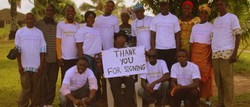Our land, our future
Communities in Liberia stand up to palm oil and demand recognition as land owners. Sign the petition 'Tell Equatorial Palm Oil No means No!' to show your support
From May 26th-28th Liberian communities impacted by palm oil came together to share their experiences and discuss their hopes for the future. There were over fifty participants from five counties in Liberia. This was the first opportunity for dialogue on agriculture concessions as a national issue to include communities affected by all four major palm oil companies; Equatorial Palm Oil, Golden Veroleum Liberia, Maryland Oil Palm Plantation (Wilmar/Olam) and Sime Darby.

The focus was on creating a space for these diverse communities to share their experiences. The same narrative of exploitation was playing out all over the country; the companies' names were interchangeable. Bringing the communities together in this way laid the foundations for connecting their separate struggles.
The first day began with a screening of the Jogbahn Clan film. The communities took great solace in learning about the Clan's unity throughout their struggle.
<a href="http://www.vimeo.com/94112823">http://www.vimeo.com/94112823</a>
Chio Johnson offered advice to the other communities, urging them to stay united in the face of the companies’ divide and rule tactics.

“Land is life, it is too valuable to lose”, he warned.

Solomon Gbargee gave a stirring speech recounting their struggle so far and urged all the communities to stand together in their resistance of the companies.
“If we lose our land how will we live?” he asked, “We are in Africa, we live by our crops. Palm plantations can’t help us”.
Communities impacted by Wilmar’s operations described resisting land clearances and the destruction of their property. When they objected to paltry compensation for destroyed crops they were told by their politicians “If you want to get nothing, take to the streets”. Communities who continued to protest faced assault and arrest.

Deyatee Kardor called on women to lead the struggle. “Because I stood up to the company people accused me of being a man but I carry the spirit of a thousand women” she proclaimed, “For those of us under struggle with a palm company we must remain strong. My land is my land, your land is your land, your forest and bushes are your bank. Don’t get tired. We cannot agree to leave our land”
Communities shared advice and support and these exchanges birthed the idea of a community solidarity network.

Day two began with a planning session for this community network which would be a way for the communities to continue to work together, supporting one another and advocating for their rights.
In the next session Robert Bimba from the Farmers Union Network warned communities, “Every time you move from your land you move from your wealth”
He gave a call to action to everyone in the room, “When you leave this workshop what will you do to stand up to landgrabbing, the time for action is now”
He explained how Liberia may have good agriculture policies but they are not working, “If the government is not making them work it is our responsibility to make them work”. He urged communities to learn about the government’s policies on agriculture and hold them to account for breaking their promises of training, tools, seeds and access to credit.

The day ended with lively discussion and the development of a declaration from the conference which was then read to the Liberian press at a press conference.

The final day was a solidarity trip to visit the communities of Jogbahn Clan. They gave a rousing welcome to the communities who all committed to continue working in solidarity. “Community Action” shouted the communities in unison. Walking with the communities around Chief Chio’s home of Blayahstown, it felt like the start of something special; the beginning of a movement for change.
Community Declaration
Acknowledging that we are the owners of our land
And that the land is our life, our bank, our hospital and our supermarket.
Noting that we have suffered to cultivate our land;
That our fields with their fertile soils are our heritage
And that we rely on and need this land for our survival.
Having realised that the concession agreements between the government and the oil palm and rubber plantation companies were signed without the consent or involvement of we the land owners,
We the community members from Gbarpolu, Grand Bassa, Grand Kru, Maryland and Sinoe counties coming together at ‘Dialogue for Development: Where next for Liberia’s Agriculture Sector?’ on May 27th 2014 have developed the following position;
- Our customary rights to our land must be respected and we must be recognised as land owners
- The concessions agreements must be amended as they violate our rights as land owners
- We as indigenous people and land owners must be involved in all decisions about our land
- Our customary land planted and cleared without our Free Prior and Informed Consent must be returned to us so we have reserve farmland with which to make our livelihoods
- Just reparations must be paid to communities whose land and properties have been damaged or destroyed
- The MOUs which do not adequately benefit communities and do not respect our rights must be renegotiated
- Further expansion by all oil palm and rubber plantation companies should be halted until these issues are resolved












